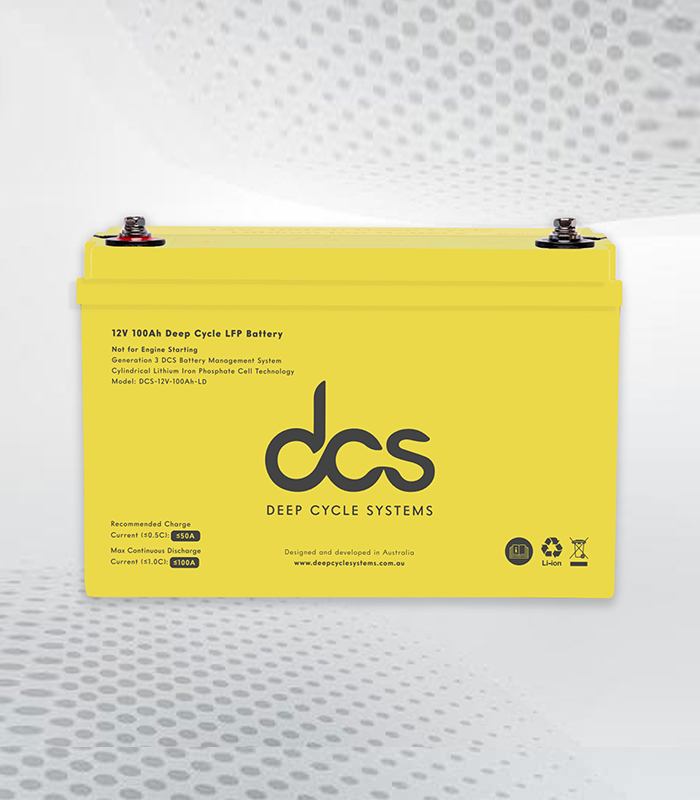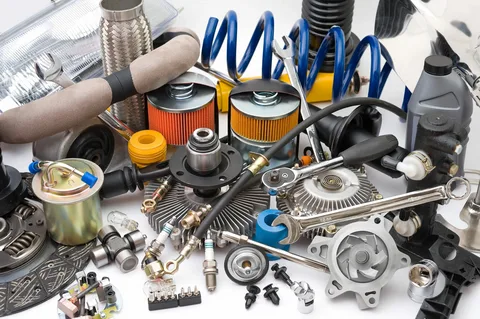Are you tired of constantly replacing the batteries in your devices? Are you looking for a more reliable and long-lasting power source? Look no further than the 12V 100 amp hour deep cycle battery. This powerful battery is designed to revolutionise how you power your devices, providing a consistent and reliable energy source for all your needs. As we delve deeper into the various aspects and advantages of the Deep Cycle Battery 100ah 12v, it becomes evident why this battery type is a cornerstone in powering a wide array of devices and systems demanding long-term, dependable energy supply.
Considerate the Basics of 12v 100 Amp Hour Deep Cycle Battery
Deep cycle batteries distinguish themselves significantly from the more commonly known starter batteries, such as those used in cars. These batteries are engineered to deliver a consistent power output over a prolonged period, making them exceptionally suited to applications where energy needs are continuous and extended.
The essence of a deep cycle battery lies in its ability to be discharged and then recharged to a significant portion of its capacity, repeatedly, without sustaining the same level of wear and damage that a regular car battery would under similar conditions.
The 12V 100 amp hour deep cycle battery exemplifies the ideal characteristics of this battery type, offering a blend of substantial capacity and resilience. These batteries are constructed with thicker plates and a denser active material, enabling them to endure the rigours of deep discharging and recharging cycles.
This structural difference enhances durability and ensures the battery can reliably support devices and systems that demand a steady and sustained energy supply. Applications that benefit from such batteries include renewable energy storage systems, electric vehicles, and marine electronics.
A deep understanding of the operational dynamics of deep-cycle batteries can significantly impact the selection process for those seeking efficient energy solutions. By recognising these batteries’ inherent capabilities and limitations, users can optimally integrate them into their specific applications, ensuring that their energy requirements are met efficiently and reliably.
The Advantages of a 12 Volt 100ah Deep Cycle Battery
The advantages of choosing 12 Volt 100ah Deep Cycle Battery solutionsare numerous and significantly impact the efficiency and reliability of power-dependent devices.
- Firstly, this battery’s superior amp hour rating ensures it can store and provide substantial energy, supporting devices for extended periods without frequent recharging. This characteristic is particularly beneficial when access to power sources is limited or non-existent, such as in remote locations or during outdoor expeditions.
- Another key advantage is the battery’s robustness against repeated charge and discharge cycle rigours. Unlike standard batteries, which may degrade quickly when subjected to constant cycling, the 12 V 100 amp hour deep cycle battery is designed to endure.
- Its construction incorporates thicker plate constructions and advanced materials that promote resilience, extending the battery’s service life and reducing the overall cost and inconvenience associated with battery replacements.
- Furthermore, the versatility of this battery across various applications cannot be overstated. It integrates into numerous settings, from renewable energy storage solutions to emergency power backups and recreational vehicles.
- This adaptability ensures that users can rely on a single type of battery for multiple needs, simplifying the logistics of power management and reducing compatibility issues.
- In addition, the environmental aspect of choosing a deep-cycle battery of this calibre is noteworthy. Its ability to withstand numerous cycles reduces waste and promotes a more sustainable approach to energy consumption.
When considering the shift towards more eco-conscious energy solutions, the 12V 100 amp hour deep cycle battery emerges as a forward-thinking choice for individuals and enterprises, championing efficiency and environmental stewardship.
Applications of 12V 100Ah Deep Cycle Batteries
The versatility of the 12V 100Ah deep cycle batteries encompasses a wide range of applications, making them essential in various sectors. These batteries are ideally suited for renewable energy systems, such as solar and wind power installations, where they store the energy generated during peak production times for use when generation is lower, ensuring a steady power supply.
These batteries prove their worth in marine applications by powering navigation systems, onboard electronics, and electric trolling motors, offering sailors and fishermen reliability far from shore.
For those who love adventure in remote areas, the 12V 100Ah deep-cycle battery becomes a critical component of RV and caravan setups, providing the electricity needed for lighting, refrigeration, and other home comforts while on the move.
Similarly, in off-grid living situations, these batteries form the backbone of power storage systems, allowing for a self-sufficient lifestyle powered by renewable sources.
Moreover, the growing trend towards electrification has seen these batteries employed in electric vehicles and golf carts, where their deep discharge capability is crucial for providing long-lasting power between charges.
In all these applications, the 12V 100Ah deep cycle battery stands out for its adaptability, resilience, and consistent performance, underpinning the functionality and reliability of systems across a diverse range of environments.
Introducing the 100Ah Lithium and LiFePO4 Options
The progression towards lithium-based energy storage solutions has marked a notable turning point in batteries, introducing more efficient and durable options such as the 100Ah lithium and LiFePO4 variants. These contemporary alternatives are distinguished by their superior energy density, enabling them to hold more power in a smaller, lighter package.
Lithium batteries, including the LiFePO4 type, are celebrated for their impressive cycle life. They can endure thousands of charge-discharge cycles with minimal degradation, ensuring a lasting service life that surpasses traditional lead-acid counterparts. This resilience translates into fewer replacements and, ultimately, a reduction in long-term costs and environmental impact.
Another hallmark of these lithium batteries is their efficiency in charging. They accept charge faster, significantly reducing the time needed to replenish their energy reserves. This efficiency is not only a matter of convenience but also enhances the practicality of using renewable energy sources, such as solar panels, by maximising the conversion of available energy into usable electricity.
Thermal stability is another benefit of LiFePO4 batteries. They offer enhanced safety with a lower risk of overheating or thermal runaway, a concern associated with other lithium-based batteries. This characteristic makes them a safer choice for various environments and applications.
Embracing the shift to lithium-based batteries such as the 100Ah lithium and LiFePO4 models heralds a move towards more sustainable, efficient, and reliable energy storage solutions, aligning with the evolving needs of both the market and the environment.
Maintenance and Care for Your 12V 100Ah Deep Cycle Battery
Maintaining and caring for your 12V 100Ah deep cycle battery is crucial to maximising its lifespan and ensuring it performs optimally. Regular inspections are essential; look for signs of wear and tear or any potential damage that may affect the battery’s functionality.
Keeping the terminals clean and free from corrosion is imperative, a common issue that can impede the battery’s performance. A mixture of soda and water bicarbonate applied with a brush can effectively neutralise and remove corrosive deposits.
Equally important is ensuring the battery is charged correctly. Utilising a charger compatible with the deep cycle battery type and not allowing the battery to overcharge are pivotal practices. Overcharging can lead to excessive heat, which may damage the battery’s internal components, whereas undercharging can result in sulphation, significantly reducing the battery’s capacity and lifespan.
Temperature plays a vital role in the health of your battery. Storing the battery in a cool, dry place when not in use can prevent unnecessary strain from extreme temperatures. In colder climates, insulating the battery may be necessary to protect it from the cold, as low temperatures can decrease its ability to hold a charge.
The Future of Deep Cycle Batteries
The development trajectory for deep-cycle batteries signals a compelling shift towards more sophisticated, efficient, and environmentally friendly power storage solutions. Innovations on the horizon promise to redefine what these batteries can achieve, focusing on enhancing their capacity, durability, and integration with renewable energy sources.
Emerging technologies aim to reduce the weight and size of these batteries whilst increasing their energy storage capabilities, ensuring they play a pivotal role in both portable and stationary applications.
A significant area of advancement is in the material science behind battery construction, with researchers exploring alternative compositions that offer higher efficiency and lower environmental impact than current models. These novel materials could revolutionise deep-cycle batteries’ production and recycling, contributing to a more sustainable energy ecosystem.
Furthermore, integrating smart technology into deep-cycle batteries is an exciting prospect. Future iterations may include advanced monitoring and management systems, allowing users to optimise their energy usage more effectively. These smart batteries could seamlessly connect with home automation systems and smart grids, enabling a more responsive and adaptive approach to energy management.
The push towards greener alternatives is also likely to accelerate the adoption of lithium and LiFePO4 batteries, thanks to their superior performance and smaller ecological footprint. As these technologies become more cost-effective, they will become accessible to a broader range of users, encouraging a shift away from traditional lead-acid options.
With these advancements, deep-cycle batteries are set to play a crucial role in the transition to a more sustainable and energy-efficient future. They will underpin various applications, from electric vehicles to off-grid power systems.
Going Green: Sustainable Options for Lifepo4 100ah Batteries
In the contemporary landscape where environmental sustainability takes precedence, the advent of greener power solutions such as the Lifepo4 100ah batteries heralds a significant stride towards eco-friendly energy utilisation.
Emphasising the shift towards renewable energy sources, these batteries underscore the imperative to minimise carbon footprints and foster a sustainable coexistence with our environment. The introduction of lithium and LiFePO4 variants within this spectrum enhances this mission, offering efficient and robust batteries that have a lesser environmental impact over their lifecycle.
The inherent efficiency and extended lifespan of the 100 Ah lithium and LiFePO4 batteries contribute to a reduction in waste and resource consumption. Unlike traditional lead-acid batteries, these advanced options necessitate fewer replacements, translating to decreased exploitation of raw materials and lower emissions associated with manufacturing and recycling processes.
Comparing 100 Ah Lithium and LiFePO4 Batteries
In advanced energy storage solutions, distinguishing between the 100 Ah lithium and LiFePO4 batteries necessitates understanding their unique attributes and suitability for various applications. Both variants’ energy density and longevity are considerable advantages over traditional lead-acid counterparts.
However, critical distinctions lie in their operational characteristics. The initial cost of lithium batteries may be higher, yet they compensate with quicker charging capabilities and a more compact form, making them ideal for scenarios where space and rapid energy replenishment are of essence.
Conversely, LiFePO4 batteries, with their exceptional thermal stability and resilience, offer a remarkable cycle life that often justifies the initial investment through extended durability and reliability. These batteries exhibit a lower risk of overheating, presenting a safer option in temperature-sensitive environments.
When selecting between these two, considerations should encompass the financial aspect and the specific demands of the application in question, including environmental conditions, charging infrastructure, and space constraints.
Conclusion
Embracing the innovative capabilities of the Deep Cycle Battery 100ah 12v ushers in a new era for efficient and reliable energy solutions. Its superior amp hour rating, resilience, and versatility make it an indispensable choice for those in pursuit of a dependable power source. As we venture into advanced battery technology, introducing 100Ah lithium and LiFePO4 variants further enriches the available options. These advancements signal a significant shift towards more sustainable and performance-oriented energy storage solutions, aligning with the evolving demands of the market and the environmental landscape.
FAQs
How does a Deep Cycle Battery 100ah 12v differ from an automotive battery?
Deep Cycle Battery 100ah 12v solutions are engineered to provide a consistent power output over prolonged periods, making them perfect for applications where energy is required steadily and for extended periods. In contrast, automotive batteries are crafted to deliver short, high-power bursts essential for starting engines. This fundamental difference dictates their respective applications, with deep-cycle batteries being unsuitable for typical automotive starting requirements.
What is the expected lifespan of a 12V 100 amp hour deep cycle battery?
The duration for which a 12V 100 amp hour deep cycle battery can serve effectively hinges on several factors, encompassing how it is used, the maintenance regimen followed, and the charging practices adopted. Adherence to recommended care and charging protocols can significantly prolong the battery’s life, often enabling it to provide reliable service for many years.
Are the higher initial costs of lithium batteries justified in the long term?
Lithium batteries represent a more considerable initial investment when compared to traditional battery technologies. However, their advantages, including superior energy density and an extended cycle life, afford them a favourable position in terms of long-term value. Their efficiency and longevity contribute to a lower total ownership cost over time, making them a cost-effective and environmentally friendly option for a wide range of applications.











